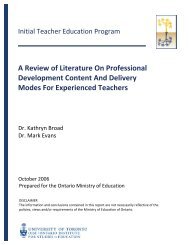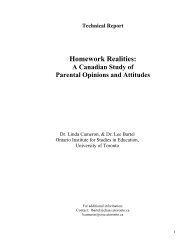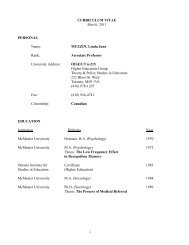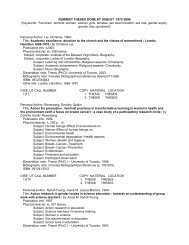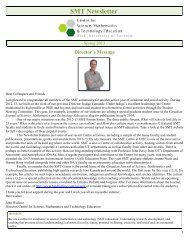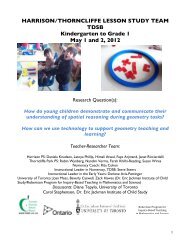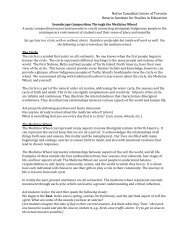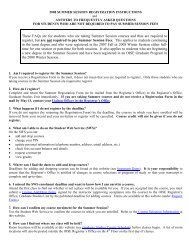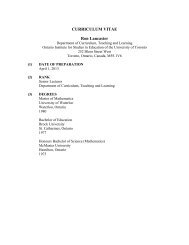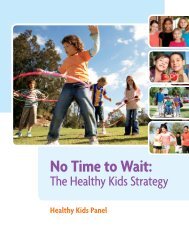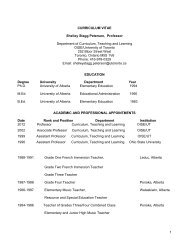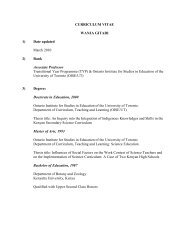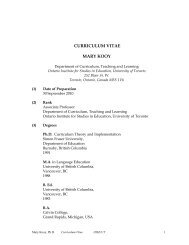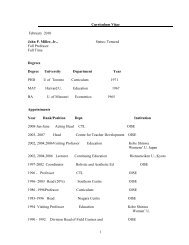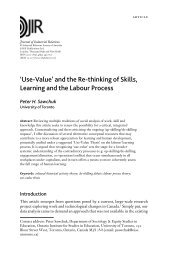The Ontario Curriculum, Grades 9-12 - Ministère de l'éducation ...
The Ontario Curriculum, Grades 9-12 - Ministère de l'éducation ...
The Ontario Curriculum, Grades 9-12 - Ministère de l'éducation ...
You also want an ePaper? Increase the reach of your titles
YUMPU automatically turns print PDFs into web optimized ePapers that Google loves.
C1.2 analyse how tourism has affected the environment within or outsi<strong>de</strong> the local community<br />
(e.g., the effects of increased tourist traffic, increased water use, rising property values)<br />
C1.3 i<strong>de</strong>ntify, through research, an appropriate co<strong>de</strong> of ethics and/or gui<strong>de</strong>lines for sustainable<br />
tourism and <strong>de</strong>scribe how they could be applied locally and globally<br />
C1.4 i<strong>de</strong>ntify and <strong>de</strong>scribe ways in which the tourism industry could offset its impact on the<br />
environment (e.g., <strong>de</strong>velop or support a tree planting program, <strong>de</strong>velop or contribute to a<br />
carbon offset fund)<br />
C2. Industry Practices and Society<br />
C2.1 <strong>de</strong>scribe, on the basis of research, how the tourism industry has changed in recent years<br />
(e.g., growth in tourist numbers, greater variety of tourist <strong>de</strong>stinations, growing<br />
popularity of eco/adventure tourism and culinary tourism) and explain how these<br />
changes have affected local and provincial communities and their economies<br />
Hospitality and Tourism, Gra<strong>de</strong> <strong>12</strong>, Workplace Preparation<br />
(TFJ4E)<br />
A. Hospitality and Tourism Fundamentals<br />
A2. Planning Nutritious Meals<br />
A2.4 i<strong>de</strong>ntify the differences (e.g., with respect to yield, nutrition, freshness, taste) between<br />
locally grown and/or organically grown fruits and vegetables and those grown using<br />
traditional cultivation techniques (e.g., use of fertilizer and pestici<strong>de</strong>s) and/or harvested<br />
unripe and transported long distances<br />
A3. Food Handling and Storage<br />
A3.4 <strong>de</strong>monstrate effective management of resources and inventory (e.g., in terms of portion<br />
control, waste management, and energy conservation)<br />
C. Industry Practices, the Environment, and Society<br />
C1. Industry Practices and the Environment<br />
C1. <strong>de</strong>monstrate an un<strong>de</strong>rstanding of how various practices connected with the tourism<br />
industry in general and the food and beverage services sector specifically affect the<br />
environment, and how these effects can be reduced<br />
C1.1 i<strong>de</strong>ntify the effects that the tourism industry has on the environment (e.g., un<strong>de</strong>veloped<br />
areas exploited for commercial gain, environmentally sensitive areas affected by<br />
pollution and waste disposal, infrastructure expan<strong>de</strong>d and upgra<strong>de</strong>d, areas of natural<br />
beauty preserved as tourist attractions)<br />
C1.2 <strong>de</strong>scribe how the food and beverage services sector can both protect the environment and<br />
encourage the sustainable use of natural resources (e.g., by choosing new locations on or<br />
near existing infrastructure to reduce the need for new infrastructure, providing guests<br />
with the option not to have linens washed daily, composting organic waste from<br />
Technological Education 201



